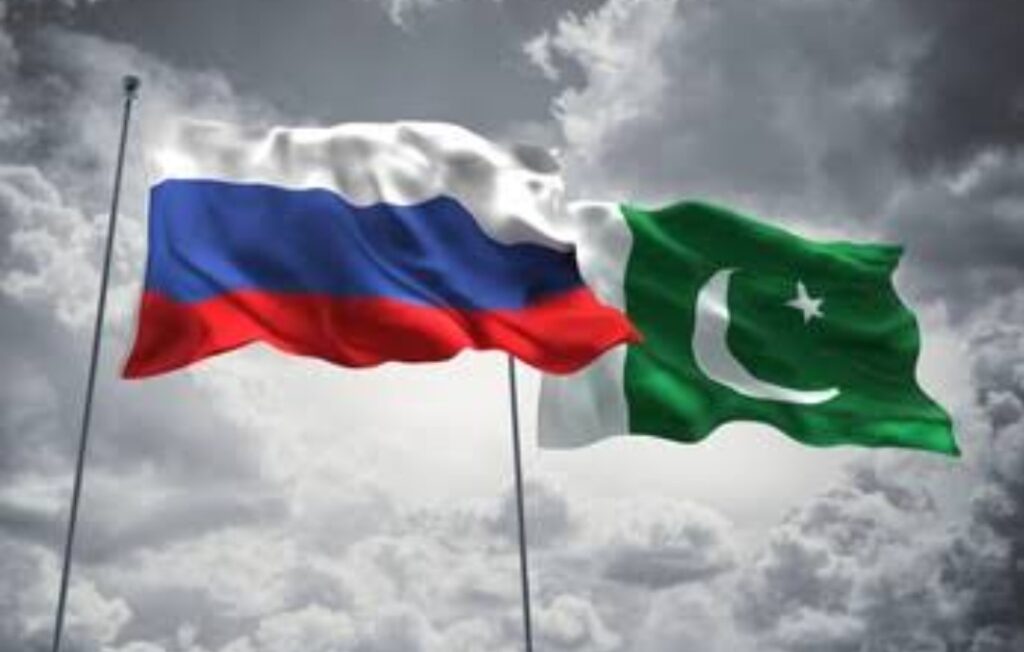By: Anuraag Khaund

On September 18-19, 2024, two days before the fourth QUAD Leaders’ Summit hosted by the US in Wilmington, Delaware, the Russian Deputy Prime Minister (PM) Alexei Overchuk had led a high level delegation to Pakistan, holding meetings with PM Shehbaz Sharif, President Asif Ali Zardari and with Deputy PM/ Foreign Minister Mohammad Ishaq Dar. While the visit by the Russian Deputy PM was a normal occurrence in light of the burgeoning Russia- Pakistan relations in recent years especially areas such as trade, energy, defence cooperation and connectivity, what stood out during the visit was Moscow’s declaration of support, albeit conditional, for Pakistan’s membership into the BRICS (Brazil, Russia, India, China and South Africa) forum. This move precedes the invitation extended to Islamabad to join the International North-South Transport Corridor (INSTC) extended by President Vladimir Putin to Islamabad during the former’s State of the Union address to Pakistan last year. Such moves have raised concerns whether the above actions are aimed at expressing Russian displeasure over the growing strategic convergence between India and the West, especially the US.
Since the onset of the Russia-Ukraine conflict in 2022, following the dictum of strategic-autonomy and multi-alignment, India has maintained a balanced position by maintaining its traditional ties with Russia while also increasing its convergence with the West. This was highlighted in the Indo- Russian summit of July 2024 between PM Narendra Modi and President Vladimir Putin which saw the strengthening of cooperation in areas such as Arctic and Far East, INSTC and the Chennai Vladivostok Maritime Corridor. At the same time, the August 2024 visit taken by the Indian Defence Minister Rajnath Singh to the US saw the signing of Security of Supply Chain Agreement (SOSA) and the Memorandum of Agreement regarding the Assignment of Liasion Officers which ensures the ‘provision of reciprocal priority support in goods and services vital for national defence in order to mitigate unanticipated supply chain risks’ and the posting of Indian Armed Forces officers in key strategic US Commands. However, the maintenance of diplomatic balance by New Delhi has not been taken kindly by its partners, such as the US which has often expressed its disdain over India’s maintenance of neutrality over Russia in Ukraine and the continued engagement with Moscow. But now, in addition to the above, there might now emerge a similar pressure from Russia expressing displeasure over India’s bonhomie with the US.
The aforementioned invitation to Pakistan to join the INSTC which was reiterated again by Deputy PM Overchuk in the joint press conference with his Pakistani counterpart Dar would prove to be detrimental to India’s interest. The main purpose behind New Delhi’s interest and active participation in the INSTC was the need to find an alternative pathway to access and tap the markets of Afghanistan and Central Asian Republics (CARs) bypassing the obstruction posed by the geographic location as well as the political stubbornness of Pakistan. Bolstering Indian participation in the INSTC is the recent Indo- Iranian agreement on Chabahar port which stipulates Indian operation as well as investment in the equipment of the Shahid Behesti terminal of the port. Any possible Pakistani participation would not only provide Islamabad the opportunity to stymie Indian connectivity interests to Central Asia by leveraging its geographical position along the route but also affect Chabahar’s prospects through competition with the port of Gwadar along Pakistan’s Makran coast.
In the same press conference, in answer to a question, Overchuk also mentioned about the possibility of linking the INSTC with the Belt and Road Initiative (BRI) of China. Such a linkage would inevitably involve the flagship project of the BRI−the China Pakistan Economic Corridor (CPEC) connecting the port of Gwadar with the town of Kashgar in the western Chinese province of Xinjiang. The above possibility will be detrimental to Indian interests as it would be counterproductive to New Delhi’s core vision of the INSTC being an alternative/ competitor to the BRI. In addition, the inclusion of CPEC− accused of blatantly violating Indian territorial integrity and sovereignty− into the INSTC connectivity project initiated by India (along with Russia and Iran) at the first place would be a geopolitical and strategic irony and could be interpreted by both Beijing and Islamabad as New Delhi’s acquiescence of CPEC and by extension, the Sino-Pakistani position on Pakistan Occupied Jammu & Kashmir (POJK).
Moreover, the joining of the INSTC and the BRI/ CPEC would also allow Pakistan to pursue its plan of linking Chabahar and Gwadar as ‘sister ports’ which was first envisaged in 2016 and even received support from China. In the backdrop of the growing strategic convergence between Iran and China as well as Tehran’s increasing dependence on Beijing in the face of Western sanctions, China is well positioned to bolster efforts towards synergising the ports of Gwadar and Chabahar through its influence over both Tehran and Islamabad. Coupled with the Chinese penetration in Bandar Abbas, a greater Chinese influence over Chabahar and Gwadar would provide it with strategic leverage over the critical Straits of Hormuz chokepoint. Most importantly, this linkage would fly in the face of Indian strategic interests and aspirations of developing Chabahar not only as a gateway to Central Asia but also an alternative and attractive transhipment hub vis-a vis Gwadar.
The other significant development of seismic potentiality was the support extended by Moscow to Pakistan’s membership bid for the BRICS. This should be seen in the light of the recent expansion of the BRICS membership last year which saw the inclusion of five new members− Iran, Saudi Arabia, United Arab Emirates (UAE), Egypt and Ethiopia as well as the interest expressed by 33 other countries to join the grouping. From the Pakistani perspective, membership into BRICS would not only come with economic benefits such as access to investment and the New Development Bank (NDB) but also an increased international profile and prestige. But from the Indian viewpoint, inclusion of Pakistan would affect the nature of the BRICS from a geoeconomic grouping to a geopolitical one and even add to the pro- Chinese tilt of the platform. The possible transformation of the BRICS into a pro-Chinese club should also be seen in the fact that in the same press conference, Overchuk referred to BRICS and the Shanghai Cooperation Organisation (SCO) as ‘brotherly organisations’− the SCO being a platform where India’s strategic space is outmanoeuvred by Chinese clout.
Both the above moves by Russia, which have adverse implications for India, can be seen as subtle moves on the part of Moscow expressing its displeasure over New Delhi’s increasing convergence and alignment with the West, especially the US and in forums such as QUAD. This is particularly in areas such as defence cooperation where Russia has traditionally enjoyed a dominant space with India. Some experts also suggest that the displeasure might also stem from PM Modi’s visit to Ukraine ; the focus on New Dehi-Kyiv defence cooperation have also raised eyebrows. Most significantly, reports of Indian ammunition being used in the Ukrainian offensive against Russia and alleged Indian ignorance of the same despite Moscow’s protests have also contributed to annoyance with India.
Yet, not all is lost in the Indo-Russian Druzba-Dosti (Friendship in Russian and Hindi respectively). This can be witnessed in the tampering down of the stated Russian support to Pakistan’s bid with Overchuk’s emphasis on ‘consensus’ (within the BRICS members) and ‘due process’ on inclusion of due process. This toning down of the statement could be seen as a signal allaying Indian concerns while reference to the intra-BRICS discussions based on ‘equality, mutual respect, and consensus’ as well as the ‘special brotherly relationship’ between the ‘sovereign and free BRICS nations’ by Overchuk could be seen as hinting towards the importance attached by Moscow to its strategic partnerships with the other members especially India. This could be seen as Russian exercise of its own ‘strategic autonomy’ vis – a vis New Delhi and Islamabad.
The above exercise of strategic autonomy by Moscow could be further corroborated by the Russian expression of support to India and Brazil’s bid for permanent membership at the UN Security Council by Foreign Minister Sergey Lavrov at the recent 79th UN General Assembly. Despite its outreach to Pakistan, Russia would not risk to alienate an ally as vital as India whose continued support and engagement, especially its oil and defence imports has helped Moscow sustain its economy in these trying times. Moreover, the importance of India’s current weight in the international system as well as its ability to act as a bridge or peacemaker with the West is also not lost on Moscow.
Yet, a close listening of Overchuk’s answers during the press conference would reveal that while addressing the question regarding Pakistan’s BRICS membership, the Russian Deputy PM began answering it by outlining the brief history of the grouping as initially comprised of four nations with South Africa joining it later. However, while mentioning the initial four countries of Brazil, Russia, and China, somehow India does not find mention in the statement. Perhaps a slip of tongue on the part of Overchuk or a deliberate and overt sign of Russian annoyance?

Anuraag Khaund is pursuing PhD in International Politics from the School of International Studies, Central University of Gujarat. He has published opinion pieces in The Diplomat, Deccan Herald, Kashmir Observer and Modern Diplomacy. His interests include International Relations and Geopolitics with a focus on Eurasia, East, West, South and Southeast Asia. In addition to geopolitics, he also looks at the intersection between civilizational histories and current global politics. The author can be contacted at khaundanuraag@gmail.com


Valuable piece
Blue Techker I very delighted to find this internet site on bing, just what I was searching for as well saved to fav
Thinker Pedia Awesome! Its genuinely remarkable post, I have got much clear idea regarding from this post . Thinker Pedia
FinTechZoomUs I do not even understand how I ended up here, but I assumed this publish used to be great
Blue Techker For the reason that the admin of this site is working, no uncertainty very quickly it will be renowned, due to its quality contents.
I do believe all the ideas youve presented for your post They are really convincing and will certainly work Nonetheless the posts are too short for novices May just you please lengthen them a little from subsequent time Thanks for the post
Your blog post was really enjoyable to read, and I appreciate the effort you put into creating such great content. Keep up the great work!